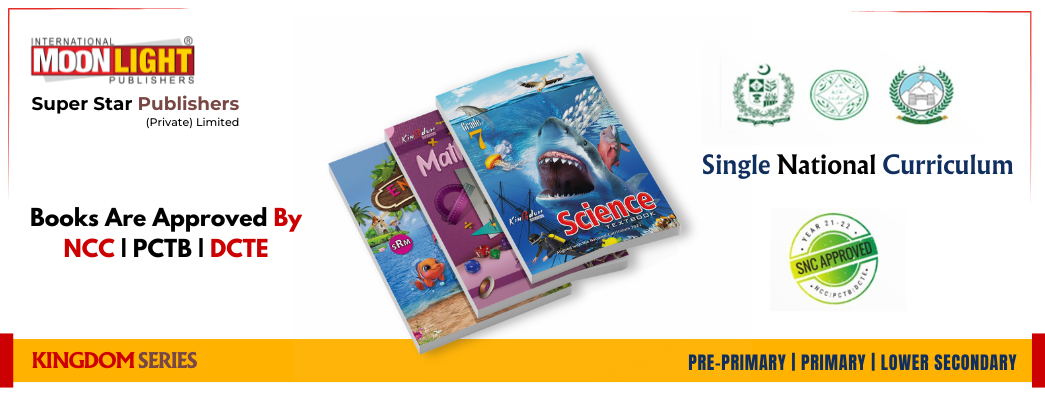- Mon - Sat: 9.00 - 6.00
- 02-Rewaz Garden, Lahore.
- 04237114420
Our Text Books Are Approved By NCC | PCTB | DCTE

Single National Curriculum
Vision
One system of Education for all, in terms of curriculum, medium of instruction and a common platform of assessment so that all children have a fair and equal opportunity to receive high quality education. Single National Curriculum is a step in that direction.
Objectives
One system of Education for all, in terms of curriculum, medium of instruction and a common platform of assessment which will ensure:
- All children have a fair and equal opportunity to receive high quality education
- Social Cohesion and National Integration
- Alleviation of disparities in education content across the multiple streams
- Equal opportunities for upward social mobility
- Equity in education
- Holistic development of children in the light of emerging international trends and local aspirations
- Smooth inter-provincial mobility of teachers and students
Key Considerations
The development of SNC is driven by the following key considerations:
- Teachings of Quran and Sunnah
- Vision of Quaid and Iqbal
- Constitutional framework
- National Policies, Aspirations and National Standards
- Alignment with the goals & targets of SDG-4
- Emerging international trends in teaching, learning & assessment
- Outcomes based approach
- Focus on Values, Life Skills Based and Inclusive Education
- Respect & appreciation for different cultures & Religions in local and global context
- Promotion of intellectual, spiritual, aesthetic, emotional, social and physical development of learners
- Move away from rote memorization & Focus on Project, Inquiry and Activity Based Learning
- Development of 21st century skills including Analytical, Critical and Creative Thinking.
- Use of Information & Communication Technology (ICT)
- Alignment with Trends in International Mathematics and Science Study (TIMSS)
Salient Features of SNC
- The SNC is standards, benchmarks and outcomes based across all subjects as compared to the 2006 curriculum in which standards benchmarks and learning outcomes were not developed for each subject curriculum.
- In 2006, the subject of Islamiat was integrated with General Knowledge up to grade 2 and started as a separate subject from Grade 3 onwards. In the SNC Islamiat starts from grade 1 as a separate subject up to grade 12.
- Previously the subject of Ethics was designated for non-Muslim students in lieu of Islamiat from Grade 3 onwards. Now a new subject Religious Education has been introduced for non-Muslim students from grade 1 onwards for five minority groups of Pakistan.
- The content of the SNC for Maths and Science has been aligned to the TIMSS content framework.
- The content is aligned to the international commitments like SDG 4.
- The SNC focusses on equipping learners with principles and attributes such as truthfulness, honesty, tolerance, respect, peaceful coexistence, environmental awareness & care, democracy, human rights, sustainable development, global citizenship, personal care and safety.
- SNC focusses on development of analytical, critical and creative thinking through a more activities-based approach rather than static teacher centric learning.
- Use of ICT is integrated in the curriculum for the first time.
- The 2006 curriculum was implemented only in government schools and some low-cost private schools. The SNC will be implemented across the board in all schools of Pakistan including government and private schools and Deeni Madaris.